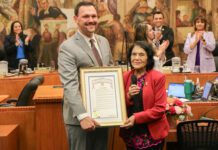EDITOR’S NOTE: This and the interview with Vice Mayor Emily Gabel-Luddy, are the final articles in a series researching the introduction of a proposed pet Sales and Breeding Regulations Ordinance that may potentially eliminate the sale of commercially bred dogs and cats in the City of Burbank.
BurbankNBeyond requested interviews with city council members to learn and publish their positions and opinions on the topic, issues, and proposed ordinance. Vice Mayor Gable-Luddy and Councilman Dr. David Gordon agreed to discuss the issue with BurbankNBeyond, other council members and the Mayor did not respond to requests for interview.
This interview segment with Councilman Gordon is the final in this series. You can also read Vice Mayor Gable-Luddy’s interview to gain a different perspective and viewpoint on the issue.
Previous articles in the series include:
- Interview with Vice Mayor Gabel-Luddy
- Burbank Takes on Puppy Mills – An Animal Rights Perspective
- Burbank Takes on Puppy Mills – A Pet Store Owners Perspective
- Burbank Takes on Puppy Mills
____________________________
BurbankNBeyond: can you give us an overview on your position regarding the sale of commercially-bred puppies in Burbank?
Councilman David Gordon: Well I have done quite a bit of research since this whole issue came up. As far as I can understand, there is no disagreement with me as far as, in any legal way, to put an end to the so called puppy mills. And I think we need a good definition of that.
If any breeder, if in the process of breeding these animals involves having (them) subjected to harm, or unsafe conditions, unhealthy conditions, we don’t think any reasonable person would oppose (shutting them down), I wouldn’t oppose that.
The concern I have is the approach being taken, and I can just give a few things that I’ve learned.
First of all if they should ban the pet stores, what it’s going to do is drive the sales of dogs underground. It does nothing to improve the welfare of pets whatsoever. It doesn’t impact the puppy mills, whatever the definition is. Because the non-pet stores that are not regulated will obtain the dogs directly from puppy mills. There is no obligation to reveal, and no obligation that has any impact on the puppy mills..
So that’s one thing.
The other thing is where the dogs come from. There are thousands and thousands of dogs being imported into the United States. I do have some information from various reliable sources that there are literally hundreds of thousands of dogs being imported from Mexico, and other countries for sale in the current retail market.
But when they come in, even if it is from outside of California, they still have to comply with the Polanco Act which calls for various vaccinations and health checks before they are marketed with warranties and guarantees to the purchasers of the dogs.
So the other problem with this, and the reason that is so important the Polanco Act is so protective to the public, is that these imported dogs often – and this is by the CDC (Center for Disease Control) in Atlanta with articles published on this, is that they (imported dogs) carry with them diseases, such as new strains of rabies that are not common in the United States which have basically been eradicated. And other exotic diseases that aren’t really obvious at the puppy stage.
Although there are laws about importing dogs that haven’t had certain vaccinations in that country – apparently there is a loophole with very young puppies which are often what is most in demand.
So there are some very severe and significant potential health consequences which I wasn’t aware of when the issue first came up which I think need to be considered by the council in passing any ordinance. Because whatever the situation is now I don’t think anyone would want to make the situation worse in terms of public health, above and beyond pet health and safety.
So that’s something I’ve learned.
Another thing is, you know, I think if there is going to be any regulation as far as where these dogs come from, I don’t understand why, and I don’t see why, any group that provides dogs should be exempted, whether it is a non-profit organization, or a rescue group, any party that is providing dogs, you can’t just put it on puppy mills, you should have to reveal the source of where the dog comes from, and the fact that it has been properly processed through health procedures with vet’s inspections and such prior to putting it out to the public.
I think this is very important, and I am very concerned that this is provided in an environment with no regulation.
There are ways I think, and I have to wait and see what our city attorney has to say, because she has some comments that she was going to provide to us, I have to wait and see what her take is on the legality of various recommendations, but I don’t see why that we couldn’t as a city, couldn’t have a regulation to prevent dogs knowingly being sold from sources that are not properly attending to the animal’s welfare, or have any other ulterior motives for providing unhealthy dogs.
I don’t think there should be a blanket proscription in saying anyone who breeds dogs and sells them is a puppy mill. I don’t believe that’s the case.
I also don’t believe it’s the case, as has been stated, you can simply adopt the pure bred dogs of your choice. I don’t buy there are readily adoptable pure bred dogs of the particular type those (people) may want.
I certainly don’t think any decision should be made in a hurried or rushed way, in an emotional way. I think it is a valid concern that folks have about the welfare of all animals.
The question I think is more what is the best way to do it (protect the welfare of animals). In my case, as a government official in Burbank. I’m not worried about what they do in other states, because I can’t control that.
But I do have a say in what happens in Burbank. So I am interested in the best solution that achieves as much as possible the goal making sure dogs and cats that are sold in Burbank are healthy, from reputable breeders. We should do that.
I’m on board with that.
BurbankNBeyond: Given all that’s happening in Burbank, do you believe this topic justifies the amount of time being spent on the issue given all the other activities the Council may be spending time on?
Councilman David Gordon: No, not at all. I think that it is of importance, and for some people it may be more important, but there are some very significant matters that are facing the council and the city. There are public issues, there are safety issues in terms of the police and fire department we are dealing with. There are budgetary issues, there are infrastructure issues that affect people’s health and safety, we must maintain our streets and our sewers and whatnot, we have to ensure issues with our schools are addressed; there are a number of issues I believe supersede this on the priorities list.
That doesn’t mean this is something that shouldn’t be heard. The overarching effort that I’ve seen put forward, I would welcome the input from any of these folks on any of the other issues that are affecting the city. And I haven’t seen that.
Many of these folks that have come and spoke or written, I’ve never interacted with them before. But judging by how energetic they are with this one particular issue, I’d hope they’d see other city and social issues where we’d welcome their input.
BurbankNBeyond: What do you think the final decision will look like?
Councilman David Gordon: I have no idea what the final ordinance is that is going to be proposed. I would hope that any ordinance will be one that every council member could support. Not only rational, but that it makes sense in terms of protecting the public across the board.
Not just for a particular group that has a particular idea of the way it should be, but we have to look at the bigger picture. I would think my mission on the council, my charge of the council I should say, is basically to see what’s in the best in the overall health and safety of the community.
And that takes into consideration what would happen to the imported dogs that are now going through traditional sellers, going through health checks as opposed to totally unregulated black market provision of animals.
So when you talk about what the ordinance will do, I don’t think any ordinance in the city of Burbank is going to stop any problems associated with illicit or inappropriate dog breeding across the country. It may send a message of some sort, but what the message is, and how effective it is, I really don’t know.
I’ll wait to see what ordinance is presented to the council to consider and act on.
BurbankNBeyond: What do the residents of Burbank need to know about this, and what do they need to prepare to engage in the discussion?
Councilman David Gordon: I think the residents of Burbank could somehow be informed that there are proposals being considered by the council that would take away the ability of pet stores to sell cats and dogs other than those which are somehow obtained by adoption.
Their ability to purchase a particular breed by going into a store and selecting it from a display or ordering it will be eliminated.
If they (Burbank residents) are OK with it – fine. If they are not OK with it, I would hope they would come on down and participate in the dialog I am sure is going to take place at the council this week.
_________________________________
EDITOR’S NOTE: The Burbank City Council Meeting Agenda for 28 January is posted, and has the following materials available for public review and download:
COUNCIL AGENDA – CITY OF BURBANK
TUESDAY, JANUARY 29, 2013
5:00 P.M. – Council Chamber, 275 E. Olive Avenue
| Introduction of Pet Sales and Breeding Regulations Ordinance – Community Development Department: Recommendation: introduce AN ORDINANCE OF THE COUNCIL OF THE CITY OF BURBANK AMENDING TITLE 5 OF THE BURBANK MUNICIPAL CODE TO PROHIBIT THE SALE OF ALL DOGS AND CATS BY A RETAIL PET STORE. |
Item 4 – Exhibit A – Ordinance
Item 4 – Exhibit B – Federal and State Regulations
Item 4 – Exhibit C – Comparison of Local Ordinances























[…] Interview with Councilman David Gordon […]
[…] Interview with Councilman David Gordon […]
Comments are closed.